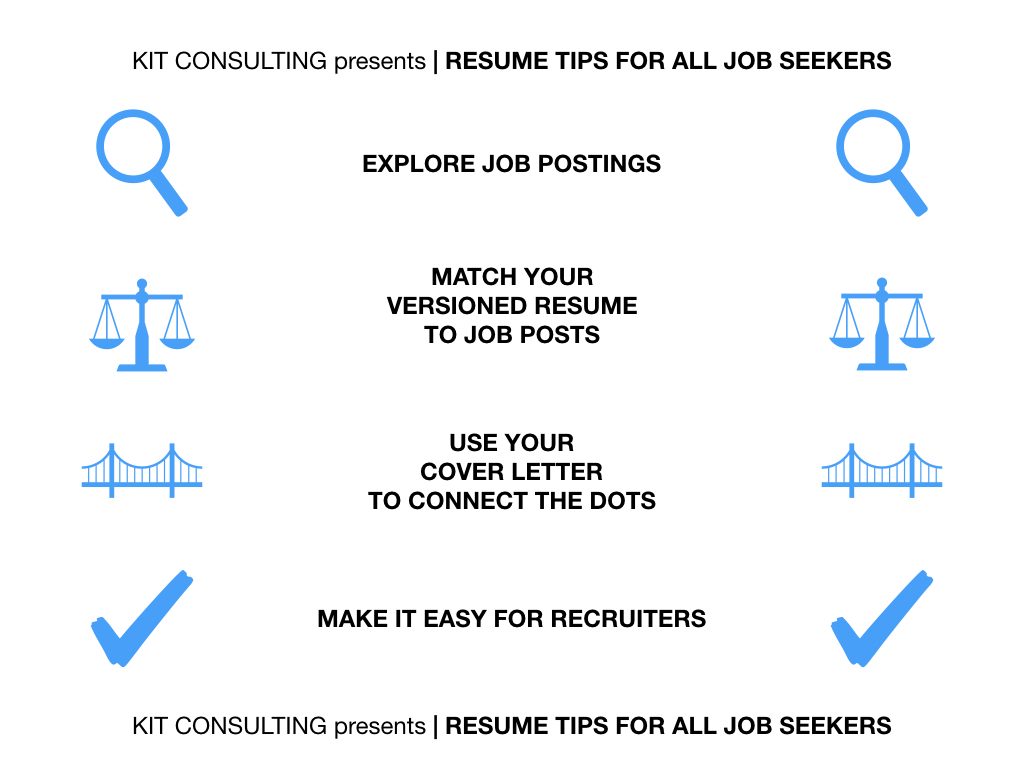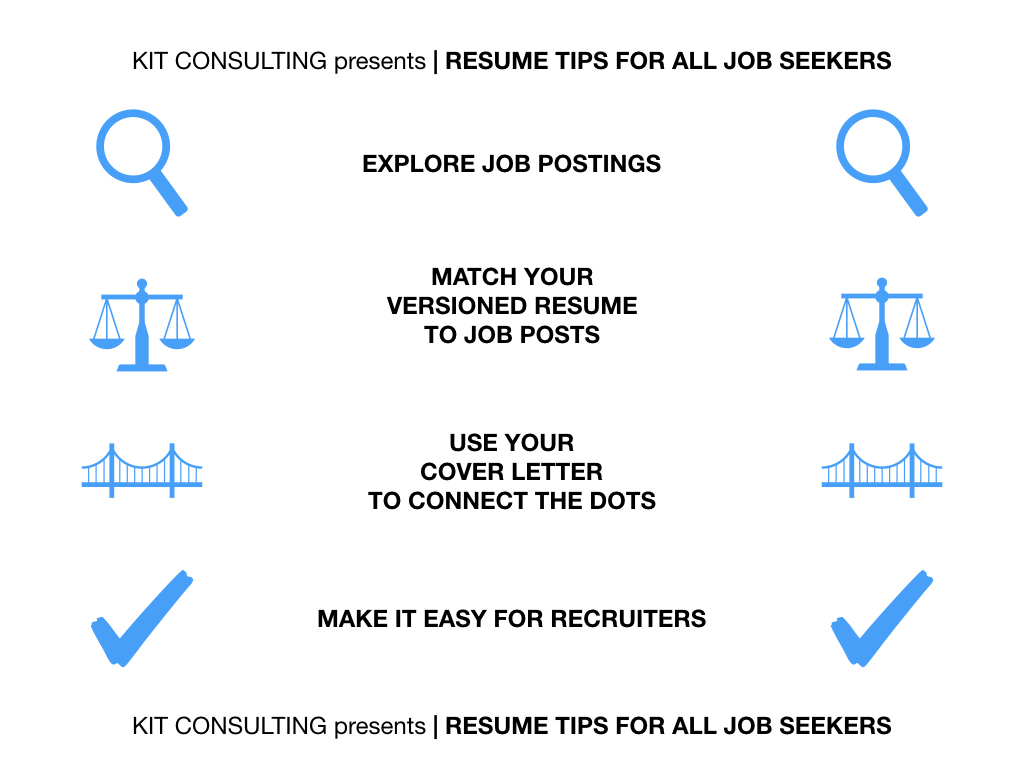Over the years, I’ve had the opportunity to volunteer as a mentor…
…and I’ve developed an approach that works well for folks of all levels and backgrounds.
Recently, I was asked to provide resume tips for all job seekers, conduct interview coaching, and provide general mentoring for folks at a Tech Job Fair and even though they were all very different [backgrounds, experience levels, etc] they all benefitted from the same kinds of advice and so I’m featuring it today.
My best resume tips for all job seekers:
- Explore job postings
- Match your versioned resume to the job post
- Use your cover letter to connect the dots
- Make it easy for the recruiters!
Here is a bit more on each of these resume tips for all job seekers:
-
Explore job postings for keywords and trends
- Find the roles you want and notice what experience, skills, and certifications they request
- list these out so you can compare them against one another, and against your resume
- pay attention to the title of the position, as this can vary between industries and even within industries
- for example, if you are a producer, that’s also sometimes called a project manager, and vice versa
- Find the roles you want and notice what experience, skills, and certifications they request
-
Version your resume to match your skills and experiences to the open position[s]
- Make a master resume with all your amazing experience and education
- it can be as many pages as it needs to be to get all that valuable info out
- focus on demonstrable value and quantifiable figures, if possible
- use blended communal/agentic language
- communal is feeling – caring, understanding, compassionate
- example: Team player who excels at collaboration.
- agentic is doing – dedicated, determined, competitive
- example: Drove sales to 10% above YOY goal.
- communal is feeling – caring, understanding, compassionate
- it can be as many pages as it needs to be to get all that valuable info out
- Create “buckets” of job “types” for which you are planning to apply
- Explore job postings for these jobs and create lists of the skills and experiences requested versus what you possess
- Create a version of your resume for each “bucket” or “type”
- include versions for different titles for the same role/responsibilities
- customize a specific skills list for each resume/bucket/job type
- list the most commonly requested skills that you legitimately posses
- focus on the notable projects, or past experiences which this job would require and feature those
- include a summary sentence and bullets of achievements
- save the version as the JobTitle_Yourlastname_Currentyear
- track when you update your resume so you can determine what changes were most impactful
- Make a master resume with all your amazing experience and education
-
Use your cover letter to connect the dots
- They want someone like you…show them WHY you are the best and HOW you will make a difference.
- Talk about WHY you are going to be successful in this position
- use the most applicable experience/skill from your resume which matches their biggest ask, if possible
- Talk about WHY you want to want to work there over anywhere else
- reference their mission, goals, or anything else which is an authentic reason
- Talk about HOW you will make the business better
- be specific but not too detail-oriented, the goal is to pique their interest [not suggest tactics]
- Talk about WHY you are going to be successful in this position
- They want someone like you…show them WHY you are the best and HOW you will make a difference.
-
Make it easy for the recruiters!
- In many cases, the first pass is done with a computer tool or AI which scans for keywords and required information
- You’ve done your homework and made sure they know you have what they want: you will pass through.
- Next, these resumes are often sent to a junior level recruiter who may or may not know anything about what you actually do
- If you have a non-traditional title, be sure to translate it into something anyone can understand
- for example, if you are a “Team Leader” that can be ambiguous so you should try to match it back to your core skills, etc
- Do not assume they will translate or understand technical jargon or industry terms
- for example, these folks may not know that HTML is also called “front-end development” so if the job requests HTML, have that listed out
- If you have a non-traditional title, be sure to translate it into something anyone can understand
- Remember, they WANT to get you in this position as soon as possible
- Make sure your contact info is accurate and you are checking your email, voicemail, and job site messages routinely
- Don’t worry if they go dark or things take a while
- if they are creating a new position, there will be no rush for them to fill it
- sometimes things require multiple levels of approval, which can take weeks or months
- Don’t harass anyone
- They said they will get back to you, trust them to do so.
- If they are able, they will give you feedback after interviews on next steps
- If they don’t or can’t or won’t, simply thank them for everything and stay positive
- In many cases, the first pass is done with a computer tool or AI which scans for keywords and required information
Here is a simple infographic you can PIN to keep this info at-hand

